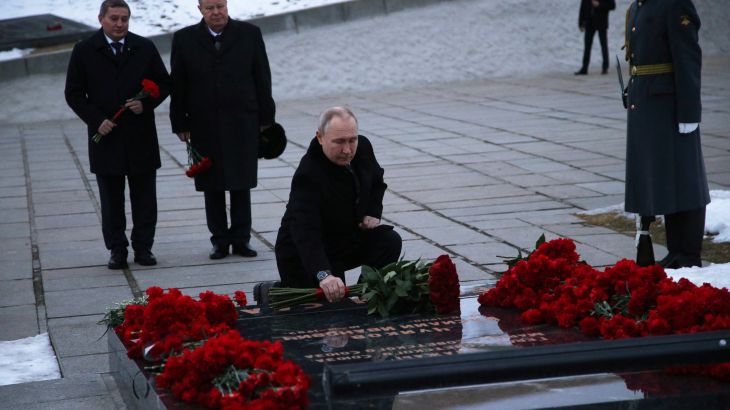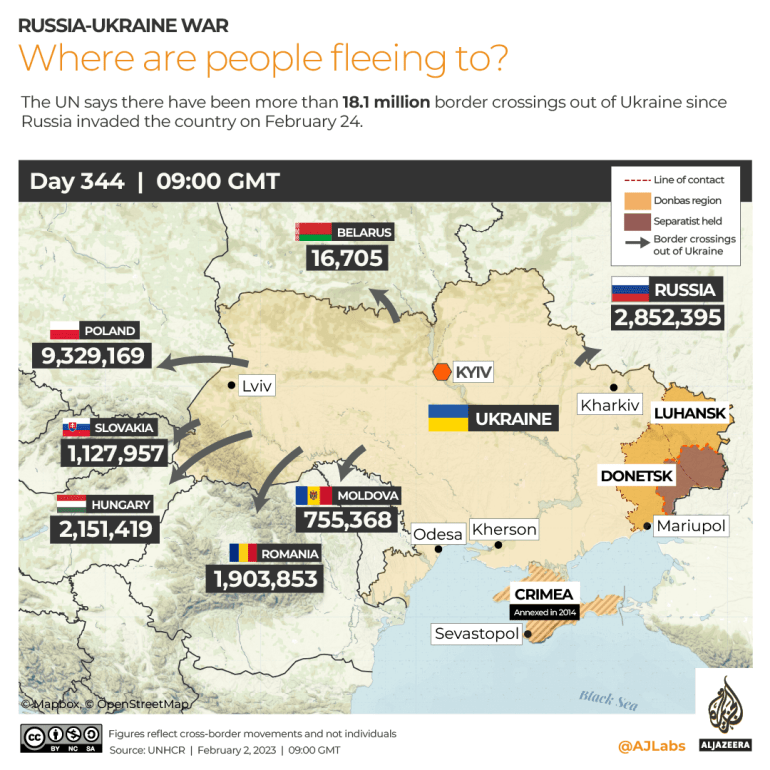Putin evokes Stalingrad battle as he vows victory in Ukraine war
Putin compared Russia’s war in Ukraine with World War II and lambasted Germany for helping to arm Kyiv.

Russian President Vladimir Putin has evoked a famous World War II victory over the Nazis to rally his nation while predicting a Russian triumph in the war in Ukraine.
Marking the 80th anniversary of the World War II Soviet victory over Nazi German forces in the battle of Stalingrad, Putin laid a wreath at the eternal flame of the memorial complex to the fallen Red Army soldiers in Volgograd, the current name of the city.
Keep reading
list of 3 itemsRussian saboteurs seek to hamper Putin’s war machine
Ukraine mourns latest tragedy as Putin promises Russian victory
“Unfortunately, we see that the ideology of Nazism in its modern form and manifestation again directly threatens the security of our country,” he said in a speech on Thursday. “Again and again we have to repel the aggression of the collective West.”
Putin and other Russian officials frequently characterise Ukraine as a hotbed of neo-Nazi beliefs, although Ukrainian President Volodymyr Zelenskyy is of Jewish descent.
Putin also lambasted Germany for helping to arm Kyiv and said he was ready to draw on Russia’s entire arsenal, which includes nuclear weapons.
“It’s incredible, but it’s a fact: They are threatening us again with German Leopard tanks with crosses painted on their armour,” Putin said.
“And they are again going to fight Russia on the territory of Ukraine with the hands of Hitler’s followers, the Banderites,” he said, referring to WWII-era Ukrainian nationalist leader Stepan Bandera, who was widely considered to be a Nazi collaborator.
Germany, which for months mulled over its decision to send tanks to Ukraine, aims to deliver them in late March or early April as part of an alliance of countries willing to supply the units to Kyiv.

Battle of Stalingrad
The battle of Stalingrad has deep resonance in Russia.
The five months of fighting between August 1942 and February 1943 is regarded as the bloodiest battle in history, with the death toll for soldiers and civilians reaching as high as two million. Most of the city was reduced to rubble before Nazi forces surrendered on February 2, 1943.
It was a major turning point in WWII and the battle remains an immense source of pride in modern Russia, lauded as a demonstration of military might and moral seriousness.
The city was renamed in 1961 as part of the Soviet Union’s rejection of dictator Joseph Stalin’s personality cult. Calls for the restoration of its old name have not received the Kremlin’s blessing.
As Russian forces struggle to gain ground in Ukraine, politicians from the dominant United Russia party have been told to liken the Ukraine fight to Stalingrad, the newspaper Kommersant reported.